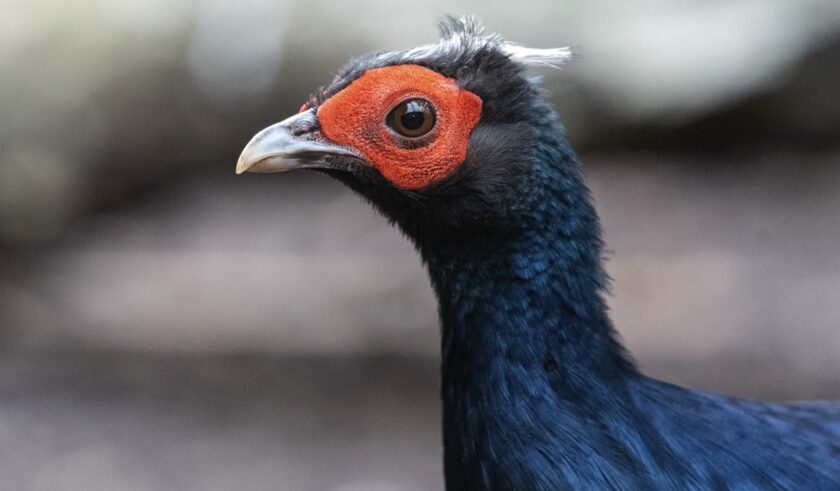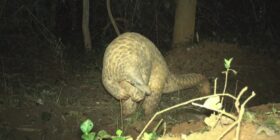Chester Zoo uses tail tags to track critically endangered Vietnam pheasants

Chester Zoo scientists are trialling a unique tail-tagging technique to help reintroduce rare pheasants to the wild.
Last week, conservationists at Chester Zoo trialled attaching dummy transmitters to the tail feathers of three Vietnam pheasants living at the zoo.
Vietnam pheasants (Lophura edwardsi) are critically endangered. In 2024, the IUCN officially added the designation “probably extinct in the wild.”
They have not been seen in the wild for 25 years and may be extinct in the forest ecosystem of central Vietnam. This trial at Chester Zoo is part of international efforts to restore the lost wild population.
The project is being implemented on the ground in Vietnam by Viet Nature who are supported by a range of other partners including Conservation Vietnam, Mandai Nature and Keidanren Nature Conservation Fund and the World Pheasant Association.

Vietnam pheasant (Picture: Chester Zoo)
Leah Williams, Lead Conservation Scientist: Population Biology, explained: “The big plan is to breed pheasants for release. When reintroducing a species it’s really important to know if they are able to survive in the wild, so post-release monitoring is vital. That’s where the transmitters come in.
“We need to know if the transmitters and attachment method will work with this species. They’re often used with birds of prey, but never on Vietnam pheasants before this project. We monitored the behaviour of the pheasants at the zoo before the transmitters were installed, so we have a behavioural baseline.
“This will tell us if the transmitters change the bird’s behaviour and whether they will tolerate them or preen them off. We want the transmitters to stay on for the lifetime of their battery and then drop off when the tail feathers naturally moult, where they can be retrieved.”
This part of the project builds on work carried out by ZSL (Zoological Society of London), which saw similar devices fitted to Vietnam pheasants cared for at Whipsnade Zoo and London Zoo. The Chester Zoo bird team were supported by London Zoo staff during the tail tagging.
These tests will help predict how Vietnam pheasants bred for release will cope with real Very High Frequency (VHF) transmitters, how long their tail feathers stay on before being moulted and how to attach the transmitters most effectively.

Vietnam pheasant (Picture: Chester Zoo)
Monitoring birds after release can be challenging, as the modules must be lightweight but send out strong enough signals to be trackable. VHF transmitters are being used instead of more high-tech Global Positioning Systems because GPS signals may not be able to penetrate the thick forest canopy. The transmitters weigh just 6g and are attached to the tail feathers using crimps.
If successful, this tail telemetry technique will be used to track the movements and health of the released birds.
This is vital to monitoring the success of the reintroduction process, which in turn is crucial to restoring the birds to their wild habitat, bringing them back from the brink of extinction.
Andrew Owen, Head of Birds at Chester Zoo, said: “If the tagging goes well here, it can be used at the conservation breeding centre, set up by Viet Nature in Le Thuy in 2020, which provides Vietnam pheasants with a training aviary where they can learn social and foraging behaviours before they are fully released.

Vietnam pheasant (Picture: Chester Zoo)
“They will be bred from Vietnam pheasants which were part of the EAZA ex-situ conservation-breeding programme (EEP), of which Chester Zoo plays an important role. Pairs are specially selected to make sure the chicks are as genetically diverse and healthy as possible, to boost their chances of surviving and breeding in the wild.
“Zoos such as London, Whipsnade and Chester play a vital role in the conservation of the Vietnam pheasant, and it’s a privilege to be working together to play our part in conserving this beautiful species..”
The vanishing of Vietnam pheasant populations in the wild has been attributed to logging, poaching and habitat loss, and environmental damage caused by chemicals used during the Vietnam War.
Males of the species have dark blue, iridescent feathers, a short white crest and distinctive red caruncles (fleshy patches) around their eyes, while females have rich brown feathers. The pheasants at Chester Zoo can be found in an aviary close to the Chimpanzees and another not far from the snow leopard habitat.
This tail tagging is a small, but very important part of a much longer-term project to develop a robust reintroduction strategy for the Vietnam pheasant, which includes removing snares from the selected habitats, engaging with trappers and continuing to develop the in-country breeding programme to produce birds acclimatised to living in the wild.
If successful, the grand-children and great-grandchildren of Vietnam pheasants cared for in European and Asian zoos will find new homes in the forests of Vietnam.
Spotted something? Got a story? Send a Facebook Message | A direct message on Twitter | Email: [email protected] Latest News








